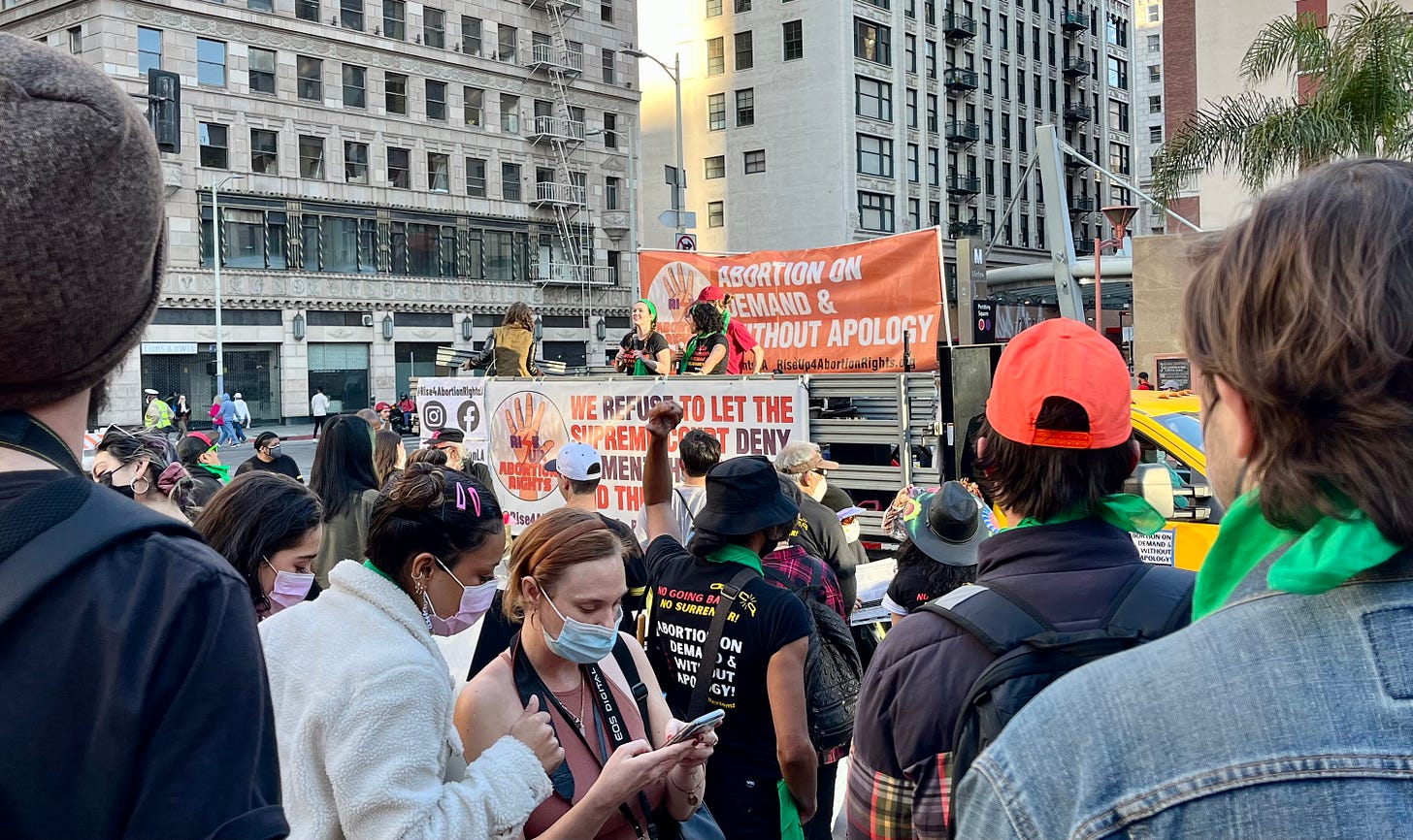
If you enjoy this podcast, you may want to read Pollitt’s book, Pro: Reclaiming Abortion Rights (Picador, 2014).
At the beginning of this podcast, you’ll listen to a demonstration: “Abortion saves lives,” one group shouts; “You’re sacrificing the mothers for the children,” another yells.
The battle over women’s bodies has always been given to rhetorical extremes. Think about the imagery—a fetus supposedly writhing with pain and fear in the widely-distributed 1984 anti-abortion propaganda film, The Silent Scream. Meanwhile, pro-abortion demonstrators insist with their own imagery that without legal abortion, women will gouge at their uteruses with coat hangers and knitting needles.
While fetuses experience neither pain nor fear, women did, and do, die without safe, accessible, and legal abortion. How many? Historian Karissa Haugeberg estimates that before 1973 when Roe v. Wade decriminalized the procedure in all 50 states, a fifth to a quarter of all pregnancies ended in abortion. Then, approximately 200 women died every year from a secret, illegal procedure often done by a medical professional. While recorded abortions increased dramatically after legalization, deaths from terminating a pregnancy dropped equally dramatically to fewer than two dozen a year. And as birth control becomes more effective, the rate of abortion has plummeted.
Yet right-wing activists and legislators want a return to a pre-Roe world, one in which effective birth control is less accessible, and women of color are far more likely to die or lose their fertility from an illegal procedure than white women. They imagine a society where pregnant Americans, no matter how young or how conception occurred, will be forced to give birth unless they can make their way to a sanctuary state or are willing to risk prison and death for an illegal abortion closer to home.
In fact, the Dobbs world is more dangerous than the pre-Roe United States, where women and girls of some means, usually white, could go abroad to terminate a pregnancy without penalty. Or they might access what was called “therapeutic abortion,” a legal medical procedure available if the mental or physical health of a woman or girl was judged by a medical professional to be endangered by carrying a pregnancy to term.
Today, in many states, all abortions of viable embryos and fetuses are banned regardless of why are where they occur.
But feminist journalist Katha Pollitt asks: why can’t all Americans admit that abortion is, and should be, a normal event in a woman’s life? Why can’t feminists reclaim abortion for what it is—a common medical procedure that permits pregnant people to take charge of their physical, psychological, and economic health?
An award-winning poet, essayist, and longtime columnist for The Nation, Pollitt made this powerful argument in 2014 in Pro: Reclaiming Abortion Rights, a book I decided to revisit as we anticipate the one-year anniversary of the Dobbs leak, the day we understood that the battle for abortion rights would have to be renewed.
Program Notes:
John Yang’s report on the leaked draft opinion of Dobbs v. Jackson Women’s Health Organization appeared on the PBS NewsHour on May 3, 2022.
Claire references the anti-abortion propaganda film, The Silent Scream: you can watch it here.
You can find Kristin Haugemann’s discussion of how women experienced abortion immediately before Roe here. For abortion trends over the last 60 years, see Jeff Diamant and Besheer Mohamed, “What the data says about abortion in the U.S.,” Pew Research Center, January 11, 2023.
The full story on a 10-year-old girl denied an abortion in Ohio in July 2022 is here, and you can read a second story about a Louisiana woman instructed by the state court that she had to carry to term a fetus destined to die at birth here. Claire also notes that many women denied the right to abort a dying fetus in Dobbs states will risk death from advanced septic shock.
You can listen to CBS News correspondent Fred Graham’s interview with “Mary Doe,” one of the two anonymous plaintiffs in Roe v. Wade, broadcast on January 22, 1973.
Katha argues that women rarely have abortions for acute medical conditions: the data shows that 60% of patients served are having their first abortion, nearly all are in their first trimester, and more than half already have two or more children and are choosing to limit the further growth of their families. A quarter of women will have at least one abortion during the course of their reproductive lives.
Does the United States ask men asked to shoulder the true “cost” of childcare? According to the Good Men Project, “view child support as `extortion’ instead of taking care of their responsibilities to their children. A 2017 government estimate shows that noncustodial parents, the vast majority of whom are men, owed over $114 billion in past-due child support. And while men have done more childcare since the pandemic, according to the Philadelphia Inquirer (March 23, 2023), “mothers performed 52% of child care, while 43% of the responsibility was shared. Fathers reported doing the majority of child care 5% of the time.”
Claire mentions historian Jennifer Holland’s Tiny You: A Western History of the Anti-Abortion Movement (University of California Press, 2020): you can read an interview with Holland here. She also notes that many women don’t know they are pregnant: about 30% of fertile women have periods that are so irregular that a pregnancy can advance well beyond six weeks before it is detected.
Is Salt Lake City, Utah, the porn-watching capital of the United States, as Claire says? That was true in 2009, but according to Pornhub, the top state for porn watching is deep-red Kansas, and the top city.
Katha and Claire discuss the popularity of abortion in the United States: for a study done by the Pew Center immediately after the decision in Dobbs, go here.
You can download this podcast here or subscribe for free on Apple iTunes, Spotify, Google Podcasts, or Soundcloud. And if you liked this episode, please:













Share this post